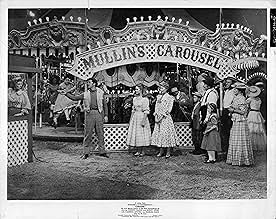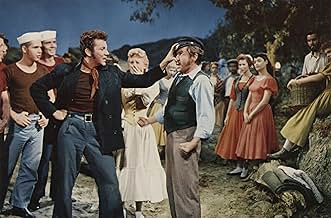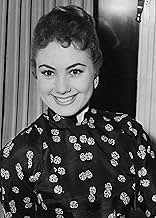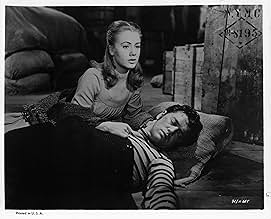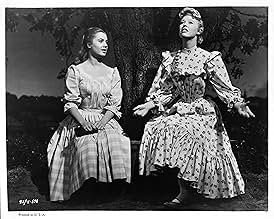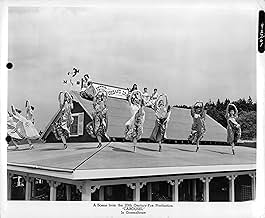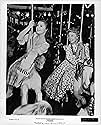Añade un argumento en tu idiomaFifteen years after his death, a carousel barker is granted permission to return to Earth for one day to make amends to his widow and their daughter.Fifteen years after his death, a carousel barker is granted permission to return to Earth for one day to make amends to his widow and their daughter.Fifteen years after his death, a carousel barker is granted permission to return to Earth for one day to make amends to his widow and their daughter.
- Dirección
- Guión
- Reparto principal
- Premios
- 1 premio y 3 nominaciones en total
- Heavenly Friend
- (as William Le Massena)
- Louise's 'Starlight Carnival' Dancing Partner
- (as Jacques D'Amboise)
- Graduation Spectator
- (sin acreditar)
- Ruffian in Louise's Ballet
- (sin acreditar)
- Townsman
- (sin acreditar)
- Dancer
- (sin acreditar)
- Dancer
- (sin acreditar)
- Third Policeman
- (sin acreditar)
Reseñas destacadas
I much prefer Carousel, whose hero is a bum. If you were to ask nearly everybody in town- a town that has done just fine without him, as a matter of fact, what Billy Bigelow contributed to their lives, they would say nothing- if they remembered him at all. The only people who would have anything good to say about him are those that he loved and who loved him. And that is the bottom line. If a person can be redeemed by his ability to love and to inspire love in others, we all have a chance. If you have to have a bank and town named after you, the bar is too high for most of us.
As a musical, this is as good as it gets. `If I loved you' is rivaled only by `Some Enchanted Evening' as a love song and it means more as it's revealing of the character of this crude man who can't express what's in his soul and this shy girl who wants only to love and be loved. `Soliloquy' is the dramatic highlight in the history of the musical as Billy works out all his hopes and dreams in his mind and vows to do anything he can to make his daughter's life special. By over reaching his bounds, he does the opposite. `What's the Use of Wondering' expresses the doubts anyone entering a relationship has and is doubly moving as it's sung by Julie, for whom we know the song will have special relevance. `When You Walk Through a Storm' offers hope to us all. Those old guys at graduations are really worth listening to.
The film begins in New England. A very impressionable young lady (Shirley Jones) sees a handsome rogue (Gordon MacRae) at the carnival and the two inexplicably fall in love and decide to marry. I say inexplicably because he is a real womanizer and NOT the type to ever settle down. As for the marriage, it is a disaster--mostly because he is a ne'er-do'-well who is afraid to work or commit himself to his lovely wife. At times, such as when he learns he's about to become a father, he commits to changing but invariably he ends up returning to his old ways. Now I was a bit uncomfortable about this, as he apparently slapped his bride around--but they made LOTS of excuses for it, such as saying 'he's under a lot of pressure' or 'I only hit her once'! So much for a film that will empower the women in the audience! I just couldn't get past the fact he was a jerk who died while trying to rob someone!
This story is apparently all part of some flashback. You see, MacRae's character is dead and he's telling this to the head honcho up in Heaven because he wants permission to return for one and only one brief period. Now considering most of the flashback consists of him acting like a clod, you wonder how this is all going to convince the powers that be to grant his request!
As for the music, it's decent but the film clearly lacks the crowd-pleasing tunes of many of Rogers and Hammerstein's other works. "South Pacific", "Oklahoma" and the rest had more memorable songs--and didn't have to work so hard to compensate for an unlikable lead. Here, it's an uphill battle. Pretty, well made...but still a film that I had a hard time liking. Overall, it looks good but fails. Watchable but among the least in the Rogers and Hammerstein canon.
It would get a perfect 10 had it been done with the original two leads that were set for the show, Frank Sinatra and Judy Garland. Judy backed out before production started and Sinatra shortly after that, so Gordon MacRae and Shirley Jones got to do a second Rodgers&Hammerstein classic.
Carousel is based on the Ferenc Molnar play Liliom and the original setting is in Molnar's native Hungary. On Broadway it was done by Eva Le Gallienne and Joseph Schildkraut and later in revival by Ingrid Bergman and Burgess Meredith. One man who did it in summer stock was Tyrone Power who if a straight dramatic version of Liliom had ever been done, would have been perfect.
Whether he's Liliom in Hungary or Billy Bigelow in 19th century New England, the part is one for a hero/heel that Tyrone Power patented on the screen. Probably Gordon MacRae benefited in no small way in having Power's favorite director Henry King in charge of Carousel.
Richard Rodgers was also used to writing for a hero/heel having done Pal Joey with his former partner Lorenz Hart. Billy is that kind of guy, a carousel barker and boy toy to owner Audrey Christie when he spots Julie Jordan and her friend Carrie Pipperidge, a couple of mill workers. It's love at first sight and marriage shortly after, but Billy's not a guy to change his layabout ways and it ends in tragedy.
One reason that Sinatra was also so right for the part was that he had made a successful hit record of Billy's Soliliquy back in 1945 when Carousel debuted on Broadway. It was a groundbreaking piece of musical theater that Dick Rodgers and Oscar Hammerstein were responsible for in the Soliliquy. Billy's just been told by Julie he's about to become a father. In an almost 10 minute number he bares his soul to the audience and sings/thinks aloud the moves he's going to make. The song is almost operatic in quality, it takes a real singing actor to put it over like Sinatra, like MacRae is here, like John Raitt in the original cast on stage.
Though it's not Julie's song, Judy Garland had a successful record with You'll Never Walk Alone. I'm sure she would have sung it in the film had she seen it through. It's probably the big hit song from the score, still an inspiring number today.
Rounding out the cast is Cameron Mitchell as Billy's no good pal Jigger, Robert Rounseville and Barbara Ruick as Mr. Snow and Carrie, the second leads and from the Metropolitan Opera Claramae Turner as Julie's cousin Nettie who does sing You'll Never Walk Alone.
Two more who are perfectly cast are John Dehner as the officious mill owner that employs the girls and the heavenly star-keeper, Gene Lockhart in one of his last roles.
Even more than in Oklahoma, Agnes DeMille's ballet numbers are used to advance the plot. From the exuberant June Is Busting Out All Over to the dance that Billy and Julie's daughter does, all are done with taste and style.
Carousel is both tragic and yet uplifting and inspiring. It's a musical for all the ages to come.
Still, as mentioned, the score sounds wonderful and remains mostly intact for the film. And Agnes DeMille provides some characteristically stunning screen choreography, especially in the trademark R&H ballet sequence.
Grade: B
But back to Carousel, the story is beautiful and moving, sad and romantic. The stuff of great musicals. And the music is wonderfully scored by the Fox maestro of the time, Alfred Newman and the superb Fox orchestra!! I think that if Fox had made this film earlier (like in the 40's, the orchestrations might have been sparser. In 1956, with bigger production spending (to get audiences away from their TVs and back into theatres), the musicals are also beefed up orchestrally (with improved stereo recording techniques) to make the most of the score. (The soundtrack is also an enjoyable one to experience on its own.)
I loved the scenery of the Maine coast...I have even travelled to Maine and made a special stop in Boothbay Harbor--much changed since 1956 I am sure, but it felt wonderful to visit there. I only wish that the town would make more of an effort to promote the fact that Carousel's location filmwork was done there.
The cinematography is splendid and lush. I love the way the camera is used in the Carousel Waltz sequence, with the music dominating any dialogue. Modern directors wouldn't dare try that today!
I can live with the juxtapositional mixes of location photography vs. the in-studio filming. Not all the dancing could be done on a real beach. And I was very pleased that the entire Soliloquy scene was shot outdoors, very beautiful camera-work following Mr. MacRae's movements. And he sings that song like it was written for him. I agree with most other reviewers here, that Mr. Sinatra was not right for this part.
Shirley Jones is just gorgeous to look at and so believable in this role. Too bad, she only really has two songs, one being the duet with MacRae. Claramae Turner's rendition of the classic You'll Never Walk Alone always brings tears to me, even now after all these years.
Even at the end, I am teary-eyed. That tells me this movie is timeless.
I hope anyone who has never seen it, and reads the reviews here, that you will be able to find as much joy and love from this great music and story that we all have.
¿Sabías que...?
- CuriosidadesThe film was not successful at the box office despite the positive reviews, but the soundtrack album became a national best seller.
- PifiasThe carousel has numerous colorful incandescent light bulbs. Thomas Edison introduced the first practical incandescent light bulb in 1879.
- Citas
[last lines]
Dr. Selden: [at Louise's graduation ceremony] It's the custom at these graduations to pick out some old duck like me to preach at the kids. Well, I can't preach at you. I know you all too well. I brought most of you into the world, rubbed linament on your backs, poured castor oil down your throats. I only hope that now I got you this far that you'll turn out to be worth all the trouble I took with you. I - I can't tell you any sure way to happiness. I only know that you've gotta go out and find it for yourselves. You can't lean on the success of your parents. That's their success. And don't be held back by their failures.
Billy Bigelow: [to Louise] Listen to him. Believe him.
Dr. Selden: Makes no difference what they did or didn't do. You just stand on your own two feet. The world belongs to you as much as to the next fella, so don't give it up. And try not to be scared of people not liking you, just you try liking them. And just keep your faith, and your courage, and you'll turn out all right. It's like what we used to sing every morning when I was a boy. Maybe you still sing it: "When you walk through a storm, hold your head up high." You know that one?
Singers at graduation: [singing] And don't be afraid of the dark.
[they continue with the rest of the song]
Billy Bigelow: [to Louise, as the singing is still going on] Believe him, darling. Believe.
[Louise joins in the singing, and puts her arm around the girl sitting next to her, who reciprocates]
Billy Bigelow: [Walks over to Julie] I loved you, Julie. Know that I loved you.
[Julie smiles and joins in singing. As the song reaches its climax, Billy and the Heavenly Friend walk away from the graduation and up a hill. Billy then takes a last look toward the schoolyard and follows the Heavenly Friend]
Singers at graduation: [singing] Walk on, walk on, with hope in your heart/ And you'll never walk alone,/ You'll never walk alone!
- Créditos adicionalesA star hurtles downward and explodes in mid-air; out of this appears the credit "Twentieth Century-Fox presents Rodgers and Hammerstein's Carousel". The other credits all appear in a straightforward fashion.
- Versiones alternativasIn the film's first two telecasts on ABC-TV in 1966, Mrs. Mullin's line "I don't run my business for a lot of sluts." followed by Carrie's retort "Who you calling a slut? Slut yourself!" and Julie says "Yeah, slut yourself!" was edited out. The line was kept on all local station telecasts of the film, and on all video releases.
- ConexionesFeatured in King of the Movies (1978)
- Banda sonoraThe Carousel Waltz
(1945) (uncredited)
Music by Richard Rodgers
Performed by the 20th Century-Fox Studio Orchestra Conducted by Alfred Newman
Selecciones populares
Detalles
- Fecha de lanzamiento
- País de origen
- Idioma
- Títulos en diferentes países
- Carousel
- Localizaciones del rodaje
- Boothbay Harbor, Maine, Estados Unidos(scenes outside Nettie's Spa and in marina, including musical numbers "June Is Bustin' Out All Over" and "When The Children Are Asleep")
- Empresa productora
- Ver más compañías en los créditos en IMDbPro
Taquilla
- Recaudación en todo el mundo
- 1104 US$
- Duración2 horas 8 minutos
- Color
- Relación de aspecto
- 2.55 : 1
Contribuir a esta página





